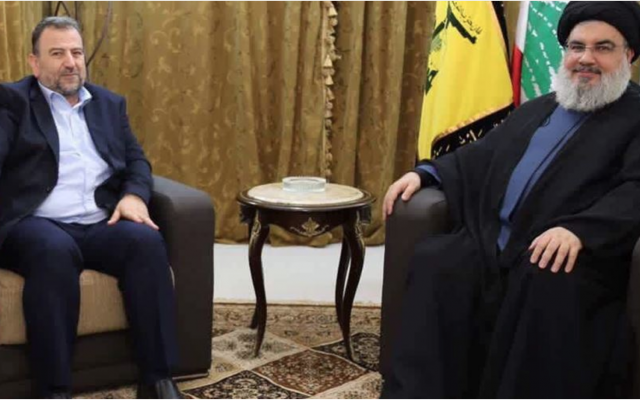FRESH AIR
New revelations from inside Hamas
July 10, 2019 | Oved Lobel

A second son of Hamas co-founder Sheikh Hassan Yousef has left the organisation. Unlike his famous brother Mosab Yousef, dubbed the ‘Green Prince’, who actually worked for the Shin Bet during the second intifada to foil Hamas attacks, Suheib Yousef has not actually defected to Israel. He claimed, however, to Israel’s Channel 12 that he had grown disillusioned by Hamas’ tactics and corruption, and during the interview made some very interesting allegations about Hamas in Turkey as well as its goals overall.
Yousef, who was working for Hamas in Turkey, expanded upon what was known about Hamas’ activities in the country. According to Shin Bet, Hamas’ Istanbul office has been running foreign agents, including the engineer Fadi al-Batash in Malaysia, as well as laundering millions of dollars via Turkish companies and funding its military apparatus in the West bank via Turkish intermediaries like Kamil Takli. The Istanbul office is allegedly overseen by one of Hamas’ primary liaisons with Iran and Hezbollah, Saleh al-Arouri, and staffed by multiple terrorists released by Israel in exchange for kidnapped soldier Gilad Shalit in 2011. Its primary task is reportedly running and expanding Hamas networks in the West Bank to undermine and overthrow the Palestinian Authority, something Israel’s Shin Bet security service has thus far helped prevent.
It is now alleged by Suheib Yousef that Hamas runs signals intelligence stations in Turkey under the guise of civil society organisations, which intercept communications from the Palestinian Authority, Israel, and other Arab states using “advanced equipment and computer programs.” This intelligence is then sold to Iran in exchange for Teheran’s financial support. While he doesn’t directly implicate Turkey’s MIT intelligence agency, it is very unlikely that Hamas has managed to establish this sort of advanced infrastructure without their support, and MIT chief Hakan Fidan has in the past reportedly cooperated with Iranian intelligence to expose Israeli spy rings and is very supportive of Hamas.
Yousef further alleges that Hamas in Turkey actively tries to recruit attackers in the West Bank, including children, to attack Israeli civilians and destabilise the area. “They send out these innocents because they want to export the crisis [from Gaza] to the West Bank,” he says.
Finally, he claims he was disillusioned by the extreme corruption of Hamas officials living in Turkey while Palestinians suffered. As he told Channel 12, “Hamas leaders [in Turkey] live in fancy hotels and luxury towers, their kids learn at private schools and they are very well paid by Hamas. They get between four and five thousand dollars a month, they have guards, swimming pools, country clubs. When I lived in Turkey I was shocked by the behaviour of the Hamas members. They ate in the best restaurants, I would see them eating at places where… one course cost $200. They loved to invite each other out for these meals. They pay $200 for one course for one person and a family in Gaza lives on $100 per month?” Hamas, he says, “is a racist terror organisation that is dangerous for the Palestinian people.”
Another son of a senior Hamas official, Hamza Abu Shanab, also recently published a historical and current overview of Iran’s relationship with Hamas for the organisation’s Al-Resalah news site. Hamza traces Iranian support for the Palestinian factions all the way back to Yasser Arafat, and says Iran has been a stalwart supporter of Hamas since the 1980s and the first Intifada, especially after Israel’s disastrous decision to deport hundreds of Hamas and Islamic Jihad activists to territory in Lebanon controlled by Hezbollah and Iran’s Islamic Revolutionary Guard Corps (IRGC) in 1989.
He divides Iranian support into multiple categories, including social welfare, political support, and aid to Palestinian media and narratives – but the most important aspect is military support, which he claims only Iran currently provides. This includes specialist training for dozens of fighters, financial and logistical aid for rocket arsenals and tunnelling, safe-houses for wanted terrorists, tens of millions of dollars for Hamas’ military wing, and easing pressure on Gaza using Hezbollah in the North. In fact, he claims that Hezbollah’s kidnapping of IDF soldiers in 2006 – which sparked a bloody Israel-Hezbollah war – was intended to relieve pressure on Gaza.
According to him, despite recent disagreements over Syria and Yemen and general apathy for the Palestinian cause due to regional upheaval, funding for Hamas’ military wing continues, and he assesses that the political relationship with Iran will soon be back to normal based on shared interests and common enemies, if it isn’t already.
Whether Hamza Abu Shanab has special insight into the current relationship with Iran is an open question. He cites other sources when it comes to the funding for Hamas’ military wing and seemingly holds no official position in Hamas. He also runs an NGO called “The Palestinian Assembly for Supporting the Syrian Revolution,” which would make him utterly toxic to Iranian sources. However, he is the son of Hamas’ deputy leader and co-founder Ismail Abu Shanab, reportedly the most moderate voice in Hamas, which likely counts for something.
What these two sons of senior Hamas officials have to tell us about the organisation and its external relationships are of great analytical value, and provide a deeper understanding of the terrorist group, its capabilities and its supporters.
RELATED ARTICLES

US Middle East strategy amid regional instability: Dana Stroul at the Sydney Institute






















